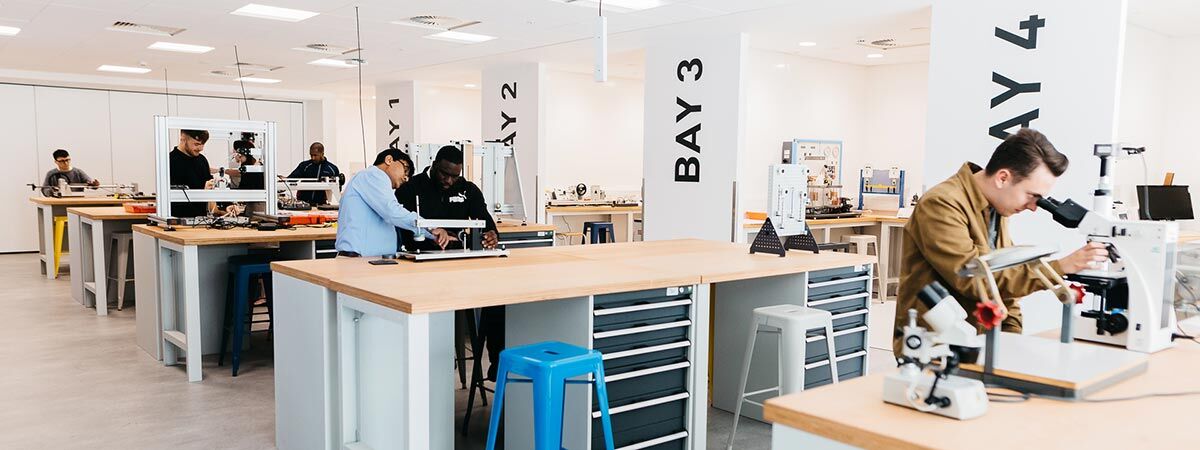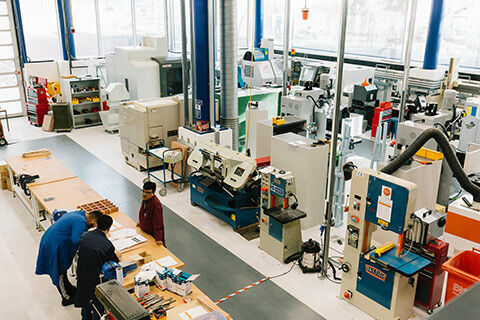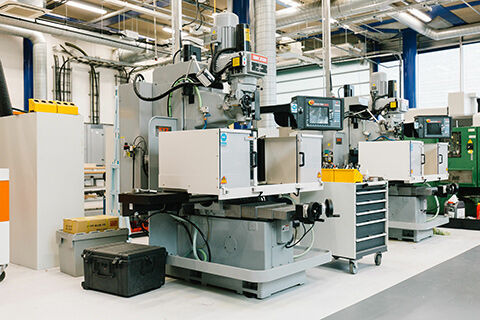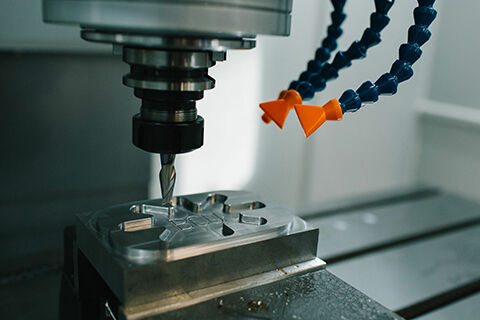
Electronic Engineering with a Foundation Year - BEng (Hons)
Currently viewing course to start in 2025/26 Entry.
Do you want to work at the forefront of industry? Our BEng (Hons) Electronic Engineering course will teach you a broad range of skills, helping you to become a rounded electrical engineer....
- Level Foundation
- Study mode Full Time
- Award BEng (Hons)
- Start date September 2025
- Fees View course fees
- Subject
- Location City Centre
This course is:
Open to International Students
Overview
Do you want to work at the forefront of industry? Our BEng (Hons) Electronic Engineering course will teach you a broad range of skills, helping you to become a rounded electrical engineer.
Throughout your degree study, you’ll have access to our state-of-the-art technology and resources, plus you’ll have the opportunity to secure yourself an industry placement, giving you instrumental electrical engineering work experience.
What's covered in this course?
All of our BEng (Hons) undergraduate courses can be studied over an extended full-time duration of four years by including a Foundation Certificate (year one of four). The Foundation Certificate provides a broad study programme that underpins the follow-on degree. In order to progress to the next year of the degree, it is necessary to achieve a pass in all of the modules of the Foundation Certificate.
You will gain an understanding of the social, commercial, legal, ethical, economic and environmental factors associated with engineering, as well as comprehensive knowledge of the science and mathematics associated with the discipline.
You will also develop the key transferrable skills that modern employers require, such as problem solving, project planning, presentation and communication. Our competitions, such as the annual Global Game Jam, will give you the chance to not only help run an acclaimed event, but also build and design your own creations, giving you invaluable experience.
Our engineering courses focus on project-based activities, giving you lots of opportunity to work in teams on projects from design to implementation. This will give you practical experience of applying engineering science to real world problems, working in multidisciplinary teams to develop your interpersonal skills, and prepare you for a key aspect of modern engineering practice.
We offer you the option of a placement during your course, either through a summer internship or year-long sandwich placement, which will provide you with the real-life skills and experience you’ll need to stand out from the crowd upon graduation. This has helped former graduates progress into roles with companies such as Rolls-Royce, Jaguar Land Rover and Wilmott Dixon.
Why Choose Us?
- Industrial placement year option - Gain desirable employability skills and work experience with the option of an industrial placement year, that will take place between your second and final year of the course.
- Employable graduates - Our graduates have progressed into roles with companies such as UTC Aerospace and Vector GB.
- State-of-the-art facilities - You will be based at our Millennium Point campus in City Centre, where our facilities have undergone a £6.5 million investment with a new maker area, engineering labs/equipment and IT equipment to provide you with the very best learning experience. You will also use our industry-standard equipment and resources, including rapid prototyping, laser-cutting and CNC machining.
- £1.1 million investment in new facilities from the IoT – The Institute of Technology (IoT) has invested in brand-new equipment and facilities, including an Electric Vehicle (EV) Test Rig, an Additive Manufacturing Machine (3D printer) and a material testing-split zone furnace - all industry grade technology that will advance your skills, making you more employable.
- Conceive Design Implement Operate (CDIO) Initiative – You’ll be provided with an education stressing engineering fundamentals in the context of real-world systems and products, to develop your practical and professional skills.
Open Days
Join us for an Open Day where you'll be able to learn about this course in detail, chat to students, explore our campus and tour accommodation.
Next Open Day: 22 March 2025
Entry Requirements
These entry requirements apply for entry in 2025/26.
All required qualifications/grades must have been achieved and evidenced at the earliest opportunity after accepting an offer to help confirm admission and allow for on-time enrolment. This can also include other requirements, like a fee status form and relevant documents. Applicants can track their application and outstanding information requests through their BCU mySRS account.
Essential requirements
80 UCAS Tariff points. Learn more about UCAS Tariff points.
If you have a qualification that is not listed, please contact us.
Fees & How to Apply
UK students
Annual and modular tuition fees shown are applicable to the first year of study. The University reserves the right to increase fees for subsequent years of study in line with increases in inflation (capped at 5%) or to reflect changes in Government funding policies or changes agreed by Parliament. View fees for continuing students.
Award: BEng (Hons)
Starting: Sep 2025
- Mode
- Duration
- Fees
- Full Time
- 4 years
- £9,535 in 2025/26 ✱ Important note for this price
- Apply via UCAS
(↩Back to price) * The Government is proposing to increase the cap on full-time regulated tuition fees to £9,535 for 2025/26 and the University is planning on increasing fees to that maximum level once legislation is enacted. Part-time fees are charged pro-rata, where applicable.
International students
Annual and modular tuition fees shown are applicable to the first year of study. The University reserves the right to increase fees for subsequent years of study in line with increases in inflation (capped at 5%) or to reflect changes in Government funding policies or changes agreed by Parliament. View fees for continuing students.
Award: BEng (Hons)
Starting: Sep 2025
- Mode
- Duration
- Fees
- Full Time
- 4 years
- £17,690 in 2025/26
Guidance for UK students
UK students applying for most undergraduate degree courses in the UK will need to apply through UCAS.
The Universities and Colleges Admissions Service (UCAS) is a UK organisation responsible for managing applications to university and college.
Applying through UCAS
- Register with UCAS
- Login to UCAS and complete your details
- Select your course and write a personal statement
- Get a reference
- Pay your application fee and submit your application
Course in Depth
Foundation Year
In order to complete this course you must successfully complete all the following CORE modules (totalling 120 credits):
Mathematics plays a key role in establishing and grounding the professional skills of an engineer. Communicating the ideas of engineering is made both easier and harder by the use of mathematical language.
This module aims to help you become proficient at developing engineering models and arguments, and following them through to their logical conclusions, since application of these arguments has to include their interpretation both to and from the mathematical language.
Mathematics plays a key role in establishing and grounding the professional skills of an engineer. Communicating the ideas of engineering is made both easier and harder by the use of mathematical language.
This module aims to help you become proficient at further developing engineering models and arguments, and following them through to their logical conclusions, since application of these arguments has to include their interpretation both to and from the mathematical language.
This module aims to provide you with the practical and professional skills to enable you to progress to the next module in the practical theme, Practical Skills II, and then on to the first year of an engineering degree.
The theoretical aspects of physical science and maths are delivered in another theme of the foundation year. The Practical Skills modules sit alongside these and concentrate on the practical aspects to support your learning.
This module aims to provide the practical and professional skills to enable you to progress to the first year of an engineering degree. As the theoretical aspects of physical science and maths are delivered in another theme of the foundation year, the Practical Skills modules concentrate on the practical aspects.
The module aims to provide you with the knowledge and problem-solving skills in physical science to enable you to progress to the next module in the science theme, Engineering Science 2, and then on to the first year of an engineering degree.
The module aims to provide you with the knowledge and problem-solving skills in physical science to enable you to progress to the first year of an engineering degree. The science theme contains the material normally encountered in an A level physics course which is relevant to entry to an engineering degree.
First Year
In order to complete this course you must successfully complete all the following CORE modules (totalling 120 credits):
The module aims to provide the underpinning knowledge and problem solving skills in engineering science to enable you to progress to the next module in the theme, Engineering Principles II, and then on to the second year of a range of engineering degrees.
As the practical aspects of engineering science are delivered in another theme of the common first year, the Engineering Principles modules concentrate on the theoretical aspects. The subject material will be delivered in two coherent streams one of which contains predominantly mechanical science and the other contains predominantly electrical science.
Mathematics plays a key role in establishing and grounding the skills of an engineer, and the ability to communicate the ideas of engineering that are expected of an engineering graduates.
The primary aim of this module is to provide the fundamental mathematical knowledge and techniques needed in order to enable you to use and apply such mathematical techniques for the evaluation, analysis, modelling and solution of realistic engineering problems. Application of these data sets has to include their interpretation both to and from the mathematical language. In addition, this module will introduce students to mathematical modelling software package. This will be used to plot, annotate basic signals and write simple programs to compute mathematical problems.
This module will develop your ability to both work on and communicate engineering realities to a wider audience, at a professional standard.
The module aims to provide the professional skills needed to enable you to progress to the next stage of the practical theme, onto your next module: Integrated Engineering Project, and then into the second year of an engineering degree.
The subject material will be delivered in two core streams: a PC-based stream, which will include the use of software to support project planning, communication and analysis, and a project-space stream, where you have the opportunity to integrate learning from across all elements of the semester.
You will develop practical professional engineering skills; including skills required for conceiving, designing, implementing and operating (CDIO) engineering solutions.
This module will interact with modules in the other two themes in the first year, relying on the knowledge of mathematical techniques, and the theoretical underpinning of the engineering principles, design and professional skills.
The module aims to provide the underpinning knowledge and problem solving skills in engineering science to enable you to progress to the second year of a wide range of engineering degrees. As the practical aspects of engineering science are delivered in another theme of the common first year, the Engineering Principles modules concentrate on the theoretical aspects. The subject material will be delivered in two coherent streams one of which contains predominantly mechanical science and the other contains predominantly electrical science.
This module will focus on introducing and building on well-established techniques for mathematically modelling dynamic systems (systems of interest for engineering) for contextualised engineering applications. The module will include an introduction to sophisticated signal analysis technique, Fourier series which is used to transform time-domain signals into their frequency spectra. The module is structured to include a mixture of lectures, tutorials and PC-based laboratories. The lectures will formally introduce material, in tutorials students will work through questions with tutor. The PC laboratories will involve using mathematical modelling software packages to implement mathematical operations.
The module aims to provide the practical and professional skills to enable you to progress on to the second year of an engineering degree. As the theoretical aspects of physical science and maths are delivered in other themes of the first year, the Practical Skills modules concentrate on the practical aspects.
The subject material will be delivered in three coherent streams one of which contains predominantly mechanical and electrical laboratory exercises, a second PC-based stream will include use of software to support project planning, design, communication and analysis and the third, a project space where you have the opportunity to integrate learning from across all elements of the semester.
Second Year
In order to complete this course you must successfully complete all the following CORE modules (totalling 120 credits):
Information is the basic thread of life and signals are the medium by which information is passed. This module will focus on classifying and mathematical modelling of signals and systems in the context of Electrical and Biomedical engineering.
During the module analytical techniques will be introduced used to transform signals from one domain to another and vice versa. While mathematical techniques will be used and contextualised for actual system hardware.
At the end of this module you will be able to determine a systems response and their applications in electronics and Biomedical engineering.
This module introduces you to the fundamentals of analogue and digital electronics using a circuit approach. It has been designed to give you a usable level of electronics theory to demonstrate key concepts.
The MEng Electronic Engineering programme is designed to produce graduates with highly developed skills both in theory and practice. This module will focus on contextualising the theory gained in Analogue and Digital electronics as well introducing embedded systems for both electronic engineering and biomedical applications.
An interdisciplinary module, you will work with students from all fields of engineering to develop skills in engineering leadership and experience creating a purposeful vision and delivering on that vision. This will set the professional skills for business in context by combining your technical course-specific knowledge with professional skills. It is proposed that the vehicle to deliver this will be the biomimicry global design challenge.
The development of knowledge in analogue and digital electronics, real-time embedded systems and programming, and robotics and control is specified in the aims of the programme. Microcontroller System Design and Programming is an introduction to programming in the C language, and to hardware and software tools and techniques for embedded systems design with microcontrollers.
The MEng Electronic Engineering programme is designed to produce graduates with highly developed skills in electronic systems design, who will have the technical and management capability required by employers in a rapidly changing technological landscape.
The aim of this module is to integrate skills and knowledge gained from your course into one practical project. The endpoint of this project will be wheeled robot capable of competing in a robotic competition, with the intention of entering a national or international competition.
Final Year
In order to complete this course you must successfully complete all the following CORE modules (totalling 120 credits):
Digital filters have numerous advantages compared to analogue filters. These filters are implemented using hardware and firmware compared to analogue filters which are implemented solely on hardware.
Successful completion of this module will allow you to be able to analyse the magnitude and phase responses of filters. Whilst this module is rich in analytical techniques and concepts, it will be contextualised at all times for practical hardware examples.
The MEng Electronic Engineering Programme aims to develop an understanding of the broad nature of electronic engineering through a themed approach encompassing analogue electronics, digital electronics, communications, embedded systems and business.
The aim of this module is to develop an appropriate knowledge of embedded systems such that on completion of the module you are able to specify, design, implement and test microprocessor-based hardware and software for real-time applications.
Embedded Systems and Control gives in-depth practical experience of designing and building realtime embedded systems, from both hardware and software perspectives. It has been designed to provide a high level of practical embedded systems knowledge which, when combined with the digital and analogue electronics knowledge gained from underpinning and parallel modules, will produce graduate electronic engineers capable of having an immediate impact in the industry.
The module provides you with an understanding and knowledge in the principles and applications of telecommunications and information networks. The module will focus on case studies of particular applications in wired and wireless communications systems and in high speed networking. Telecommunication and networking technologies are key components of modern revolutionary technologies. This module provides you with the knowledge to understand modern communication systems and the functions of the Internet. In addition, you will gain related analytical skills that can be applied in designing modern communication systems and information networks.
This module provides an introduction to the principles of high frequency electronics and to familiarise you with the theory and application of analogue building blocks for high-frequency applications.
It will enable you to gain an in-depth understanding of power electronic devices and analysing power electronic circuits.
The purpose of the module is to enable you to undertake a sustained, in-depth and research-informed project exploring an area that is of personal interest to you. In agreement with your supervisor, you will decide upon your topic which will take the form of a practical outcome (artefact) with accompanying contextual material. The main consideration when choosing your topic is that it must be aligned to the programme you are studying, and you should consider the relevance of this topic to your future academic or professional development.
At this level, you will be expected to work independently but you will receive additional one-to-one support from your supervisor, who will be familiar with your chosen topic area. As you progress on the module, extra support will be available and this may take the form of group seminars, workshops and online materials that will help to develop your project.
Download course specification
Download nowEmployability
We will provide you with the attributes you need to be successful in employment. Upon graduating, you’ll be able to demonstrate professionalism at all levels, as well as being a creative problem solver with innovative ideas, a global outlook and an open-minded, diverse personality.
Birmingham City University also has the Graduate+ scheme, an extracurricular programme which has been designed to hone the subject-based skills you develop throughout the programme alongside broader employability skills. You’ll develop skills in CV writing, presentations, a portfolio and more.
International
Birmingham City University is a vibrant and multicultural university in the heart of a modern and diverse city. We welcome many international students every year – there are currently students from more than 80 countries among our student community.
The University is conveniently placed, with Birmingham International Airport nearby and first-rate transport connections to London and the rest of the UK.
Our international pages contain a wealth of information for international students who are considering applying to study here, including:
- Details of the entry requirements for our courses
- Some of the good reasons why you should study here
- How to improve your language skills before starting your studies
- Information relevant to applicants from your country
- Where to find financial support for your studies.
Facilities & Staff
Our Facilities
Our state-of-the-art Engineering labs and workshops provide the perfect setting for practical work with modern-day teaching and learning facilities. We pride ourselves on equipping our students with the skill set that they need not only working on industry standard equipment, but having industrial links, which set them up perfectly for a career in engineering.
We have invested in industry-standard facilities to support the practice-based elements of our Engineering courses and give students as much practical learning as possible, to prepare for industry placements and job opportunities after graduation. Students have access to our facilities during classes, and can book out of class sessions with our specialist technicians.
We are a partner of the Greater Birmingham and Solihull Institute of Technology (GBSIoT) and have secured £1.1 million of government funding for investment in brand-new equipment and facilities. Funding of £808,000 from the Department for Education has supported our development of an Electric Vehicle (EV) Test Rig, an Additive Manufacturing Machine (3D printer) and a material testing-split zone furnace.
The IoT has enabled procurement of new technologies for material testing, electronics prototyping and production and 3D scanning to compliment computer aided design for manufacture.




Our staff
Dr Fawaz Annaz
Reader in Mechatronics
Dr. Fawaz Annaz had a long international career in Mechatronics Engineering, where has taught and conducted research in many countries including the UK, Singapore, Japan, Malaysia and Brunei.
More about FawazDr Venkatesh Vijay
Associate Professor
Dr Venkatesh Chennam Vijay received his PhD in Engineering for extending Knowledge-Based Engineering (KBE) principles into engineering distance learning from Birmingham City University (BCU). Currently, Vijay has been working on the STEAMhouse India initiative established by Munjal family-run BCM Foundation and Birmingham City University at...
More about VenkateshProfessor Wenyan Wu
Professor in Advanced System Engineering
Professor Wenyan Wu has extensive interdisciplinary teaching and research experience across Engineering, Computing, and Technology throughout the UK and abroad. Her knowledge and expertise span the following areas: electronic engineering, informatics, water and environmental engineering, sensor technology, smart sensing and communication for...
More about Wenyan






